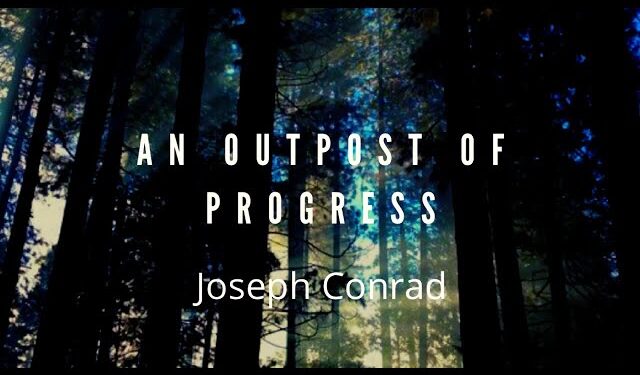Introduction
An Outpost Of Progress Summary By Joseph Conrad Joseph Conrad’s “An Outpost of Progress”, first published in 1897, is a short but impactful narrative about two European men, Mr. Kayerts and Mr. Carlier, who are stationed at a remote outpost in Africa. The story takes place during the late 19th century, a period when European powers were aggressively colonizing African territories. The setting is a desolate and isolated location along the Congo River, far removed from the structures of European civilization.
Conrad’s story presents a critical view of European colonialism, examining the psychological and moral degeneration of the two men as they are immersed in the brutal, uncivilized environment of the African wilderness. They are tasked with managing a trading post and gathering ivory from the local tribes, but their isolation, combined with their inability to truly understand the people they are working with, leads to destructive consequences. Through this narrative, Conrad explores themes of human nature, imperialism, isolation, and the corrupting influence of power.
The story’s tone is dark and cynical, a reflection of Conrad’s personal experiences in Africa. An Outpost of Progress is notable for its commentary on the futility of colonial efforts, the collapse of European ideals in the face of reality, and the ultimate moral degradation of the colonizers.
Summary of An Outpost of Progress
Arrival at the Outpost
Mr. Kayerts and Mr. Carlier arrived at the outpost in a remote part of Africa with a sense of duty and optimism. Both were Europeans, assigned to manage a trading post on the Congo River. Their mission was to facilitate the collection of ivory from local tribes and establish some order in a land that was unfamiliar, chaotic, and far from the comforts of European civilization.

The outpost was nothing more than a small collection of huts, surrounded by dense jungle. The men were faced with a daunting and inhospitable environment, the oppressive heat and constant sense of isolation wearing them down. They quickly realized that the natives they were supposed to interact with were indifferent and uncooperative, offering little help in their mission.
Both men, who were strangers to one another before this assignment, found themselves increasingly reliant on each other as they struggled to maintain a sense of purpose. The tension between them began to simmer as the weeks passed, each man’s character flaws starting to emerge in the stifling isolation.
The Struggle for Control
As the days wore on, Kayerts and Carlier found that their task was not as simple as they had been led to believe. The ivory trade proved to be more difficult than anticipated, and the indigenous people were reluctant to provide the necessary resources. The men struggled to understand the local customs and often resorted to coercion or threats to get what they wanted. Yet, they were confronted by their own lack of power and authority in this unfamiliar environment.
Kayerts, who was more passive and introspective, began to question the purpose of the mission. He was deeply disillusioned by the way the Europeans treated the African people, feeling a sense of guilt for his participation in a system that seemed to exploit and degrade them. In contrast, Carlier, who was more aggressive and impulsive, grew frustrated by the lack of progress. He became increasingly paranoid and hostile, lashing out at both the natives and Kayerts in moments of despair.
The outpost became a microcosm of the larger European colonial project—a futile attempt to impose order and civilization on a land that did not conform to their values. The men’s interactions with the indigenous people were fraught with tension, and their isolation only deepened their inability to understand the culture and values of the people they were supposed to be managing.
Read more
Moral Decline and Violence
As time passed, the men’s mental states began to unravel. Carlier, feeling the mounting pressure of their task, grew increasingly erratic and unstable. He began to behave more violently, directing his anger toward Kayerts, whom he blamed for the outpost’s lack of success. Kayerts, on the other hand, became more withdrawn and introspective. His guilt and uncertainty consumed him, leaving him paralyzed by inaction.
The arrival of a new character, a trader named Mr. Maclean, intensified the tension between the two men. Maclean was a hard, cynical man who saw the colony as nothing more than a business venture. He offered the men advice, but his recommendations were often manipulative and self-serving. He represented the darker side of colonialism: the ruthlessness and greed that drove the Europeans to exploit the resources of the land and its people without any regard for the consequences.
In one critical moment, Carlier, driven to madness by the pressure and isolation, took extreme action. The story builds toward a tragic climax, where Carlier’s violent impulses lead to a deadly confrontation. The outpost, once a place of tentative hope for the two men, became a symbol of their moral decay and the ultimate failure of their colonial mission.
The Tragic Conclusion
In the end, both Kayerts and Carlier are irreparably broken by their experience at the outpost. Their isolation, compounded by their inability to understand the land and people they were sent to dominate, results in their psychological destruction. Conrad presents this conclusion as inevitable—the failure of the colonial enterprise is not just a failure of action, but a failure of understanding. The men, unable to reconcile their European values with the harsh reality of Africa, ultimately lose their humanity. The story ends with the disintegration of both the men’s moral compass and the colonial outpost itself.
Themes in An Outpost of Progress
1. The Corruption of Civilization
One of the primary themes in An Outpost of Progress is the idea that European civilization, when transplanted into an unfamiliar environment, can become corrupted. The story critiques the European belief in the superiority of their culture and institutions. Kayerts and Carlier are representatives of European civilization, but their inability to adapt to the African environment and their ethical decline reveal the fragility of their supposed progress. The men’s moral degeneration shows how the imposition of European ideals onto Africa is not only misguided but ultimately destructive.
Read more
2. The Psychological Effects of Isolation
Another important theme in the story is the psychological impact of isolation. Kayerts and Carlier are isolated not just physically, but emotionally and intellectually as well. The remote location of the outpost exacerbates their internal struggles, and they become increasingly disconnected from reality. Conrad uses their descent into madness to show how humans, when removed from the societal structures they depend on, can lose their sense of self-control and rationality.
3. Colonialism and Exploitation
The story directly critiques colonialism and the exploitation of African people and resources. The European characters, despite their pretensions of civilization, are shown to be just as savage as the environment they inhabit. The violence and manipulation they use to achieve their goals demonstrate the ruthless nature of imperialism. The outpost itself becomes a symbol of the futility of colonial efforts, as it is slowly undone by the actions of its own inhabitants, who are driven by greed, fear, and misunderstanding.

4. The Illusion of Power
Both Kayerts and Carlier are given power over the local tribes, but their authority is fragile and ultimately illusory. The natives do not fear them in the way the men believe they do, and the real power lies in the environment itself—an uncontrollable force that neither man can master. This theme highlights the futility of colonial authority in the face of a land and culture that are beyond European comprehension and control.
Read more
FAQ
1. What is the main theme of An Outpost of Progress?
The central theme of An Outpost of Progress is the moral and psychological disintegration of two European men isolated in a remote African trading post. It critiques colonialism and exposes the corruption of European civilization when placed in an unfamiliar, hostile environment. The story also addresses the isolation, exploitation, and illusion of power that permeates the colonial experience.
2. How does Conrad portray colonialism in the story?
Conrad presents colonialism as a futile and destructive enterprise. The men, tasked with managing the outpost, are portrayed as morally bankrupt and incapable of understanding or respecting the indigenous cultures they encounter. The story critiques the idea of European superiority and highlights how colonialism leads to exploitation, violence, and the degradation of both the colonizers and the colonized.
3. How do the characters’ psychological states evolve throughout the story?
At the beginning of the story, both Kayerts and Carlier are somewhat optimistic and dutiful, but as they spend more time at the outpost, their isolation and frustration erode their mental stability. Kayerts becomes passive and introspective, consumed by guilt, while Carlier grows paranoid and violent. Their psychological unraveling reflects the harmful effects of their environment and the colonial system they are part of.
4. What role does isolation play in the story?
Isolation is a crucial theme in the story. The physical isolation of the men at the outpost mirrors their emotional and intellectual isolation from each other and from the world they knew. It is this profound isolation, coupled with their lack of understanding of the environment and the people, that leads to their eventual downfall. The story shows how isolation can break down an individual’s sense of self and drive them to madness.
5. What is the significance of the outpost in the story?
The outpost represents the broader failure of the colonial project. It is a symbol of European attempts to impose order and civilization in a land that resists such control. The outpost, poorly managed and ultimately abandoned, reflects the fragility of colonial power and the illusion of progress that imperialism sought to promote.
Read more
















